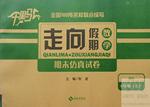18.To many web-building spiders,most of whom are nearly blind,the web is their essential window on the world:their means of communicating,capturing prey(猎物),meeting mates and protecting themselves.A web-building spider without its web is like a man cast away on an island of solid rock,totally out of touch and destined to starve to death.
So important is the web to an orb-web spider's survival that the animal will continue to construct new webs daily even if it is being starved.For 16 days the starving spider builds completely normal webs.Then,as the animal gets scrawnier(憔悴的),it constructs a wider-meshed web using fewer strands(线).Such webs would only trap larger prey,which is more economical from the perspective of a starving spider.
The spider stores energy by recycling web protein.It simply eats its own web each evening and reuses it to produce new silk.In studies with radioactively,labeled materials,it was found that 95 percent of web protein reappears in the next day'web.Most of the energy needed for web-building is used in walking over the strands as they are laid down.
Scientists are impressed by the adaptability of the spider's highly preprogrammed brain,which is larger for its size than the brain of any other invertebrate(无脊推动物).If web-building is interrupted,or if some of the existing strands are destroyed,the spider simply goes back to see where the web is left off and then finishes building a normal web.One spider will finish building the incomplete web of another.
8.What is probably the best title for the passage?C
A.Secrets of Spiders'Adaptability
B.Secrets of the Spiders'Life
C.Importance of Webs to Spiders
D.Spiders'Highly Preprogrammed Brain
9.According to the passage,which of the following statements is TRUE?A
A.Web-building spiders will probably die without their webs.
B.One Web-building spider usually conducts one web.
C.Most spiders will stop conducting webs when hungry.
D.Web-building spiders have good eyesight.
10.A spider conducts a wider-meshed web whenB
A.it is 16days old
B.it is getting weaker
C.it has fewer wends
D.it hunts for food
1.A spider's ability to finish an incomplete web proves thatD
A.it reuses its web protein to reproduce new silk
B.it is able to rebuild a destroyed web
C.the incomplete web is much more important
D.it has a highly preprogrammed brain.
分析 本文是一篇科教类阅读,属于说明文,本文主要讲述了蜘蛛与蜘蛛网的关系,蜘蛛网对蜘蛛非常重要,一个没有网的蜘蛛就像一个被扔在荒石岛上的人,完全与人失去联系,注定要饿死.
解答 8.C.主旨大意题.阅读全文,根据文章内容可知,本文主要讲述了蜘蛛与蜘蛛网的关系,蜘蛛网对蜘蛛非常重要.故选C.
9.A.细节理解题.根据A web-building spider without its web is like a men cast away on an island of solid rock,totally out of touch and destined to starve to death.可知,一个没有网的蜘蛛就像一个被扔在荒石岛上的人,完全与人失去联系,注定要饿死.A.没有网的话,蜘蛛很可能会死掉.故选A.
10.B.细节理解题.根据Then,as the animal gets scrawnier(憔悴的),it constructs a wider-meshed web using fewer strands(线).可知,蜘蛛用更少的线构建网,当它更虚弱时.故选B.
11.D.细节理解题.根据Scientists are impressed by the adaptability of the spider's highly preprogrammed brain,可知,蜘蛛的高度预编好的大脑的适应性给科学家们留下了深刻印象.下面用蜘蛛能修补好蜘蛛网为例证明这个论点.反之,蜘蛛能修补好蜘蛛网证明了蜘蛛有高度预编的大脑的论点.故选D.
点评 本文是一篇科教类阅读,题目涉及多道细节理解题,推理判断题,主旨大意题.做题时学生应仔细阅读原文,把握文章主要内容,联系文章上下文内容并结合所给选项含义,从中选出正确答案,一定要做到有理有据,切忌胡乱猜测.



 千里马走向假期期末仿真试卷寒假系列答案
千里马走向假期期末仿真试卷寒假系列答案